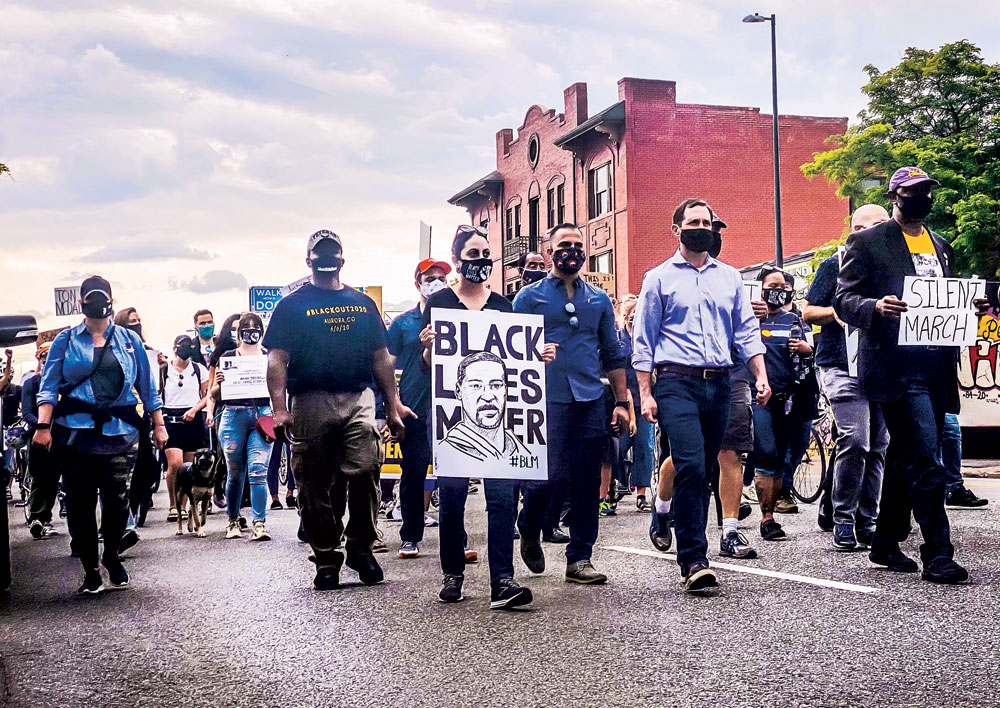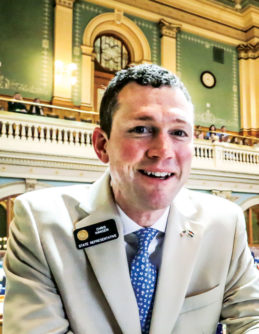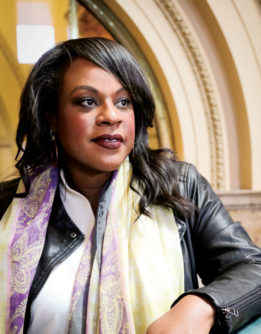 As Rep. John Lewis’ death on July 17 reminded the nation, the civil rights movement shaped a generation of leaders that transformed politics. Does the current historical moment likewise represent a watershed in US history? Will the confluence of Covid-19 and the ongoing wave of social movements redefine our political life for the generations that follow? Will future historians point to this moment as the one that created a new style of politician?
As Rep. John Lewis’ death on July 17 reminded the nation, the civil rights movement shaped a generation of leaders that transformed politics. Does the current historical moment likewise represent a watershed in US history? Will the confluence of Covid-19 and the ongoing wave of social movements redefine our political life for the generations that follow? Will future historians point to this moment as the one that created a new style of politician?

Rep. Jason Crow, shown here in a march from City Park to the Capitol on June 19, says he is encouraged by the young leaders he sees. Front Porch photo by Christie Gosch

State Sen. Chris Hansen speaks with optimism about the future of politics. File photo from 2019.
State Senator Chris Hansen (D-31) views the current “extraordinary” circumstances—anxiety and widespread unemployment from the pandemic coupled with George Floyd’s brutal murder that opened long-festering wounds and expanded public awareness—as signals that Coloradans will turn out in record numbers to vote in the fall, and reconfigure politics.
“What happened to him [Floyd] has happened to thousands of people over our history, and the underlying conditions of unemployment, the feeling of disenfranchisement…added intensity to what we’re seeing now,” says Hansen. He is optimistic that this new energy will be transformative in a positive way.
“I think there will be leaders who emerge from this who have sharpened their message, their skills, and their ability to reach people, and that’s always been true throughout American history,” says Hansen, anticipating how current unrest, combined with a pandemic that has disproportionately devastated Black and Brown communities, will transform domestic politics.

State Rep. Leslie Herod believes we’re witnessing a sea-change in politics.
“I think we are witnessing a sea-change in politics,” says State Rep. Leslie Herod, who represents District 8. “I think we’re witnessing a recognition of the lack of diversity, and, I think, respect for Black lives in politics—and we’re seeing folks who want to rectify the damage that has been done.”
Herod is genuinely excited at the young people she sees assuming the mantle of leadership, who have a different political style than traditional politicians. “We are bolder. We are goal-oriented. And we are unapologetic,” she says, citing Tay Anderson (DPS School Board) and Shontel Lewis (RTD Board) as “people who have really stepped up” and who are suggestive of the changes ahead in politics as well.
US Rep. Jason Crow (D-06) says he has seen incredibly talented young people taking the lead on gun reform and climate change, and he expects they will lead the charge for racial justice, which has been “deferred for too long.” “I hope we see a new wave of leaders and elected officials come out of these movements,” he says, reflecting on the entrenched politicians and resistance to change he has observed in Washington, D.C.
“We need new faces. We need people who are willing to be bold and to force change in a positive direction, so I hope it [the current wave of activism] inspires people. One of the biggest challenges that we face right now in politics is apathy….I really hope that instead of that apathy continuing that this is emboldening people and encouraging them to step forward.”
Even before the recent events in Portland, when asked about a possible political backlash and the implications of calls for “law and order,” US Army veteran Crow said, “I think we have to be extremely careful and vocal on the use of any military in a situation like this; there’s obviously a historical precedent for how it can go wrong. The military just shouldn’t be politicized and shouldn’t be used on our streets.”
For Hansen, new legislation that increases police accountability is only part of the picture at the state level. He points to the budget discussions as carrying profound weight as well: “The budget is ultimately the moral document, the moral priorities of the state, and has a huge impact on people’s daily lives, their welfare, their ability to seek out economic opportunity. And we’re having a very robust discussion about the budget, including how to make the tax code more progressive and less regressive.”
Crow emphasizes the importance of getting involved, saying, “Decisions are going to be made that are going to greatly impact your life and your family’s life, they will be made whether you are engaged or not. The question is whether you’re going to have a seat at the table. Either you’re going to be at the table to help make those decisions and have a voice, or somebody else is going to be filling that seat. But the process will go forward with or without you so, it’s better that it goes forward with you.”
Herod is optimistic that the current momentum will lead to lasting change, but she is also cautious. “One bill doesn’t equal equality. One march doesn’t equal equality.” She recalls walking the streets of Denver with Lewis, and draws from his inspiration. “He was a very optimistic person, and he never stopped fighting.”



0 Comments